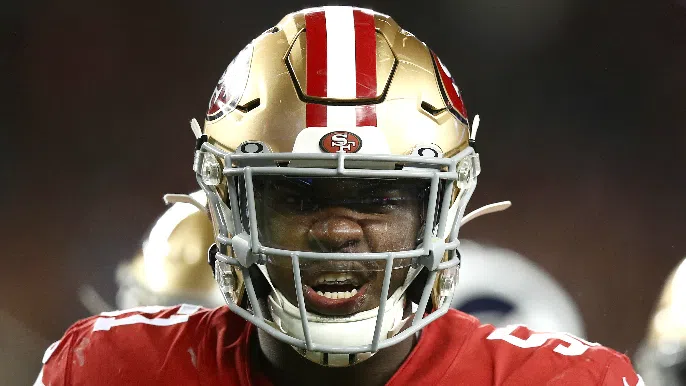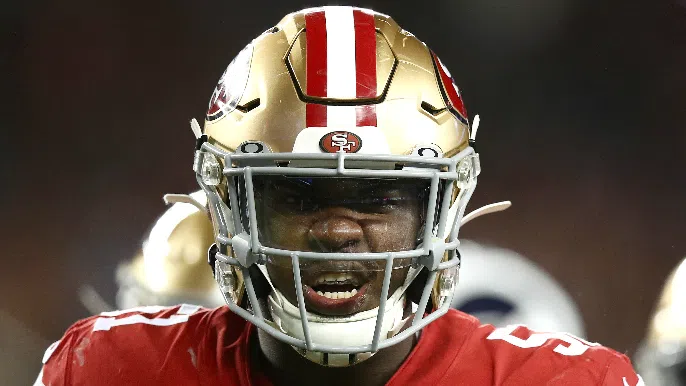Photo by Ezra Shaw/Getty Images
When training camp gets underway, there are always players, usually with names you’re unfamiliar with, whose stories you are unaware of, who catch your eye. Azeez Al-Shaair was one of those players.
The undrafted rookie out of Florida Atlantic University was a preseason stud, and played his way onto the roster in a five-man linebacking group ahead of veterans like David Mayo and LaRoy Reynolds.
The more you talk to Al-Shaair, the less it surprises you that he made the roster.
Maybe the only reason he went undrafted was the fact that he tore his ACL in his senior season. In his four-year career, he had 395 tackles, headlined by a 146-tackle season in his junior year, which was the third-best mark in all of Division I football in 2017.
He constantly faced homelessness with his family of seven siblings growing up in Tampa, Florida, which was supported almost entirely by his mother, Naadhirah. In 2012, the family, living in Al-Shaair’s grandmother’s home, awoke to the smell of smoke. Al-Shaair led his siblings out of the home, but the house, and all that was in it, was gone.
That proved to haunt Al-Shaair’s mother in more ways than just the uncertainty of shelter — which the family eventually found in an extended-stay motel, cramming all nine of them a single room.
As Al-Shaair worked relentlessly at his craft, he earned a full scholarship to Florida Atlantic University, sending as much money as he could home. His coaches told him he had to stop. He didn’t.
“As a grown man, I think when you’ve been in some of the situations I’ve been in and been through the things I’ve been through, you treat money, objects — like for me, clothes, money, all that stuff don’t really mean much for me,” Al-Shaair told KNBR. “But I know what it can do for people in need.”
Al-Shaair — who rides his bike to work just about every day except in the case of the torrential downpour on Thursday of this week — said if not for his wife, Yahaira, he might not have any possessions. He’s a minimalist who lives a lifestyle of using only what’s necessary, because he knows all too well what it’s like to only have what you have. And often, for Al-Shaair, that wasn’t much.
When Al-Shaair’s home burned down in 2012, his family’s tax documents, receipts, really any identifying information about them, was lost. For a family on food stamps, that meant long-lasting, and horrendously unjust consequences.
For about the last seven years, Al-Shaair’s mother had an arrest warrant out. Not because of a crime, but because the government believed, due to her lack of tax documentation, that she was fraudulently using food stamps. That meant that for the last seven years, Naadhirah had been unable to leave the state of Florida.
“I guess over time where she was using the food stamps, it ended up amounting to like $5,000,” Al-Shaair said. “In their heads, they’re thinking she’s scamming, and we’re homeless the whole time.”
Those lingering legal barriers were especially painful at the start of the regular season. In Week 3, when the 49ers hosted the Pittsburgh Steelers, the team tried to coordinate to bring all the rookies’ parents out for the game. Al-Shaair knew that wasn’t an option for his mom, and didn’t let her know about the plans, he said, so she wouldn’t feel bad about being unable to come.
But Al-Shaair’s mom found out and knew that the cloud that was hanging over her for the last seven years wouldn’t allow her to see her son play in California (she did see the team’s season-opener at home in Tampa against the Buccaneers).
“She had already saw it from an email, and she was depressed about it because she felt bad that she was never really able to support me,” Al-Shaair said.
That’s when the 49ers, having found out about the legal situation, assisted Al-Shaair in finding a lawyer, telling him that once the situation was resolved, they would honor their commitment to bringing his mom out to a game.
On Wednesday of this week, the case against Naadhirah were dismissed. For the first time in seven years, there was no longer an arrest warrant in her name.
“I know it’s gonna be more emotional when I see her, but like, when she first texted me, I couldn’t stop smiling,” Al-Shaair said. “So I’ve kind of been just happy all day, since four or five in the morning, I’ve been smiling, up. So I’m just really happy for her and happy for our family… For the first time in almost seven years, she can actually live her life and go do what she wants to do.”
With that elation came a sobering reality. All it took was a lawyer, which cost $5,000, Al-Shaair said, and those seven years of uncertainty and pain were expunged in five months. Growing up with nothing, and knowing so many others in similar situations, the reality, Al-Shaair said, is disheartening.
“I think that’s the biggest part and that’s why you feel so bad for other people because you can only imagine what people go through,” Al-Shaair said. “You can only imagine the things that people go through when you don’t got money, when you don’t have resources. And that’s the struggle for a lot of minorities all across the country, you just kind of have to deal with it.
That’s why a lot of times, people have bad relationships with the law. Because a lot of times, it doesn’t always serve the people that need it. It kind of serves the people that got the money.
Honestly, it’s more sad than frustrating, because to think that me hiring this lawyer that costs about, $5,000, which is a lot of money for pretty much anybody who’s working a regular job, doing anything normal, but especially talking about people in poverty. That’s your whole income tax.
To think that some that $5,000 can just be spent on a lawyer and you can avoid going to prison, going to jail over something that’s really stupid, at the end of the day, it’s more sad than anything. I just want to make sure I can just take this experience and try to help and find a way in the near future to give back to others that might be dealing with stuff like this.”
That elation, of course, came on the first day of 49ers practice this week before Al-Shaair plays in the NFC Championship game as a rookie.
“Shoot, I feel like I done already won. It’s just amazing right now,” Al-Shaair said. “It feels more surreal than even being in this NFC Championship game. And then on top of that, being in the NFC Championship game? Shoot, I don’t think I’ve had this good of a week in a long time. It’s a great feeling.”
That sweet bite of news on Wednesday did come with a bitter aftertaste, as Al-Shaair found out later in the week. While he had been hoping to bring his mom out for the game on Sunday, and coordinating with 49ers director of player engagement, Austin Moss, Al-Shaair’s mom will have to wait just a bit longer for the dismissal of her warrant to clear.
“They said about a week,” Al-Shaair said Friday. “It’s sad how the justice system works. It’s easy to be accused, but it’s very hard to clear your name… But I’m still happy that it’s over and done with.”
As frustrating as the delay and inability for his mom to join him this weekend is, Al-Shaair was overwhelmingly relieved about the news. Throughout the process, he said, he had the support of teammates, pointing to veterans Richard Sherman — who advised him early “don’t give an F” —and Kwon Alexander.
“Azeez, we’re real close man. He’s a legendary guy, he’s been through a lot,” Alexander told KNBR. “He’s been working hard. l just try to take him under my wing because I know when I was a rookie, Lavonte David, Danny Lansanah, they took me under their wing and I panned out well, so I was just trying to do the same for him.”
But more than anyone, Al-Shaair says he’s been supported by his wife, Yahaira. And it’s been that way since they met as freshmen in high school. At the worst time in so many kids’ lives, when angst and anger and uncomfortability is a constant, Al-Shaair had someone looking out for him.
The silent kid who tucked himself away at one of the least conspicuous desks, head folded into his arms, felt a tap on his shoulder: Yahaira.
“She’d go in there, tap on my shoulder, ‘Hey, how you doing? Can you smile?’ Because I would be that kid just sitting in the back of the room with his hoodie on, quiet,” Al-Shaair said. “She would always give me a hard time and tell me to smile and ask me how my day was. That’s a story I tell everybody because it’s something I’ll never forget. And that’s the type of thing where she didn’t have to do that, especially as freshman in high school. Nobody’s thinking that type of way.”
Yahaira helped Al-Shaair through moments of doubt, and hopelessness, through times he wasn’t sure of himself, or whether his mom’s case would ever be resolved. And now it has. That grit, support, and faith led Al-Shaair to a position where he could help his family, and his mom, who he says he’s always looked up to.
“She’s obviously been somebody very special to me,” Al-Shaair said. “Anybody that knows me or talks to me know that I love my mother dearly and I admire her, so I’m just honestly blessed.”
Their reunion might be delayed, but if anything, that’s only more coal in Al-Shaair’s ever-burning fire. One more win, and Naadhirah will see her son play in a Super Bowl at home.
“Now I’ve got a big goal,” Al-Shaair said. “Huge goal… and it will [happen]. I believe.”









